Redditor Questions The Ethics Of Returning A Clearly Mismatched Rescue Dog To Shelter
The journey of pet adoption is often viewed as a heartwarming story of rescue and companionship. It brings hope and a chance for a new start for many shelter animals, offering them a loving home and a caring family.
The act of adoption itself is hugely rewarding and beneficial, providing therapeutic companionship and unconditional love to the adopter. However, like any major life decision, it isn't always as straightforward as it seems.
While a prospective pet owner may be enamored with the idea of adopting a cute furry friend, it is critical to match the pet's energy levels, temperament, and needs with the owner's lifestyle and living conditions. A crucial mistake many adopters make is choosing a pet based on its looks rather than its compatibility with their lifestyle, often leading to challenging circumstances for both parties.
In this case, OP had thoughtfully approached the adoption process, clearly conveying their lifestyle, preferences, and living situation to the rescue shelter. However, it appears that the rescue may have mismatched OP with a dog that doesn't suit their living conditions or lifestyle.
OP adopted a dog that was initially believed to be a perfect match for them. However, the reality turned out to be much different.
The dog, a young and energetic bundle of fur, was not settling well in OP's small house with no usable yard. Despite OP's best efforts, which included thrice-daily 45-minute walks and regular potty breaks, the dog's high energy level was too much for the small living space.
The dog would often cause mayhem indoors, jumping on furniture and breaking things. Moreover, the dog would growl and bark at OP when they tried to discipline or train him, further highlighting the mismatch.
Now, OP wants to return the dog to the shelter.
OP asks:

OP adopted a dog that was initially believed to be a perfect match for them. However, the reality turned out to be much different.
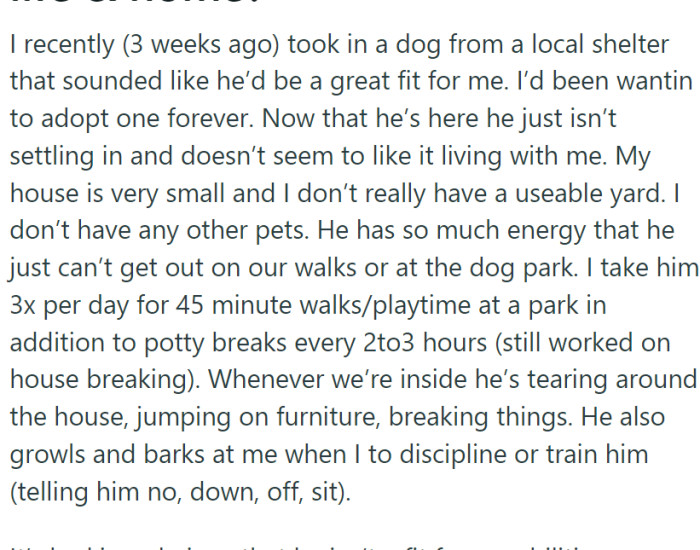
The dog, a young and energetic bundle of fur, was not settling well in OP's small house with no usable yard.
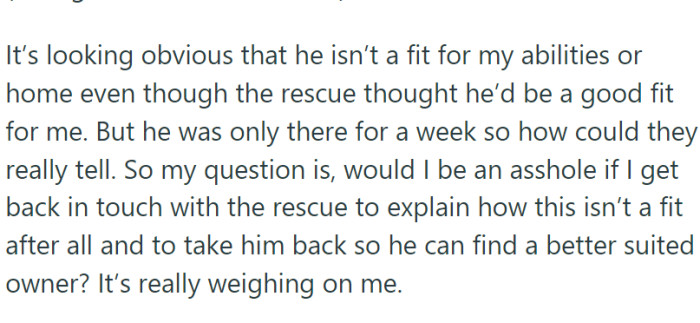
Ethics of Pet Adoption and Responsibility
Dr. Sarah Collins, an animal behaviorist at the University of Toronto, emphasizes that returning a rescue dog can evoke strong moral dilemmas.
Her research indicates that many individuals feel conflicted about their commitment to animals, especially when faced with challenges.
This often stems from the emotional weight of the decision and the fear of failing to meet the animal's needs.
OP posted an edit about the adoption process, and it seems they are not doing it right:
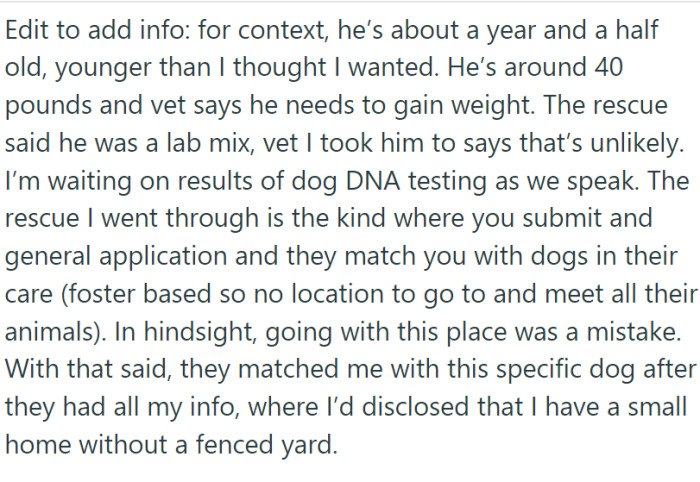
OP has offered the following explanation for why they think they might be the a-hole:

"No one is prepared for a problem dog unless they've dealt with problem dogs before."
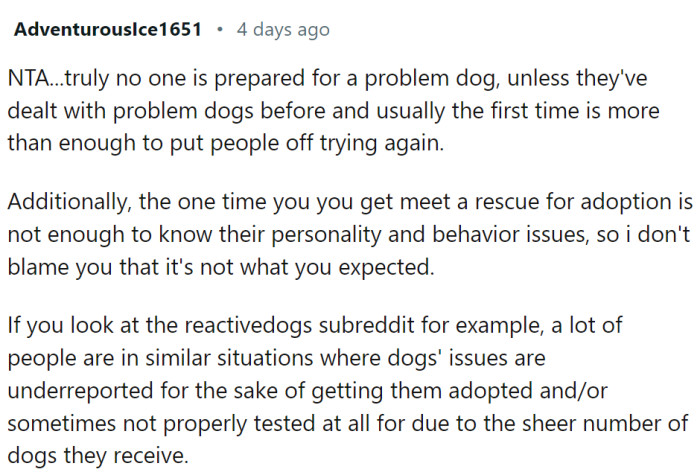
From a psychological perspective, the concept of 'cognitive dissonance' plays a significant role in these situations.
When individuals act in ways that contradict their beliefs or values—such as returning a pet they initially rescued—they may experience feelings of guilt and anxiety.
Acknowledging these emotions is crucial for making informed decisions about pet ownership.
Some additional problems may arise:
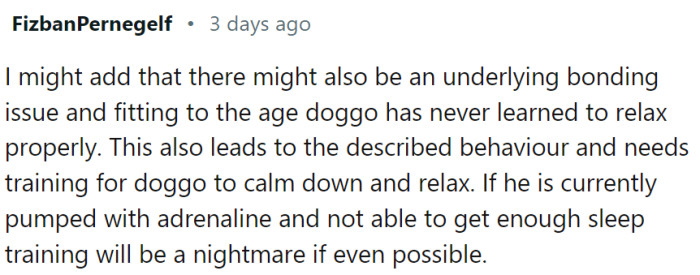
It is better to re-home a dog you can't handle than to have a miserable cohabitation.
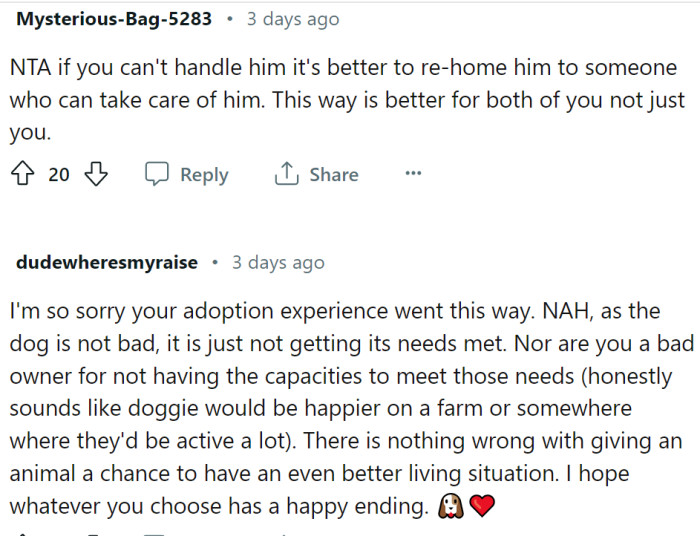
This Redditor was in a similar situation:

Practical Considerations for Pet Ownership
To address the ethical considerations surrounding pet adoption, potential owners should conduct thorough research before committing to bringing a pet into their lives.
Studies indicate that understanding the specific needs of different breeds and individual animals can lead to better matches and a higher chance of successful adoptions.
Seeking guidance from professionals, such as trainers or behaviorists, can provide insight into what to expect from a new pet.
Maybe OP is a cat person?

The bottom line is:

In this specific case, it's clear that the adoption process has been mishandled by the rescue center, leading to a stressful situation for both OP and the dog. Returning the dog to the rescue may seem like a difficult decision, but it's the right one, given the circumstances.
It's evident that OP's living situation and lifestyle can't cater to the dog's energy level and needs. The dog deserves a home where it can expend its energy freely and receive the right kind of training and discipline. Meanwhile, OP deserves to have a pet that fits seamlessly into their life and home.
Therefore, while returning a rescue dog may carry a negative connotation, in this instance, it's actually in the best interest of both parties involved. The rescue center should take this as a lesson to improve their matching process to prevent such mismatches in the future.
Furthermore, creating a support system for new pet owners can help alleviate the pressure of ownership.
Research shows that having a network of friends or family who are also pet owners can provide emotional support and practical advice.
Joining local pet groups or online communities can foster connections and help individuals navigate challenges more effectively.
Psychological Analysis
This situation highlights the emotional burden that often accompanies pet ownership decisions, where feelings of guilt and responsibility conflict.
Encouraging prospective pet owners to reflect on their capabilities and commitment can lead to healthier outcomes for both the animal and the owner.
Analysis generated by AI
Analysis & Alternative Approaches
The decision to return a rescue dog is often fraught with emotional and ethical complexities.
By acknowledging these challenges and seeking support, potential owners can make more informed decisions that align with their values.
Ultimately, fostering a sense of responsibility toward pets is essential for their well-being and happiness.



